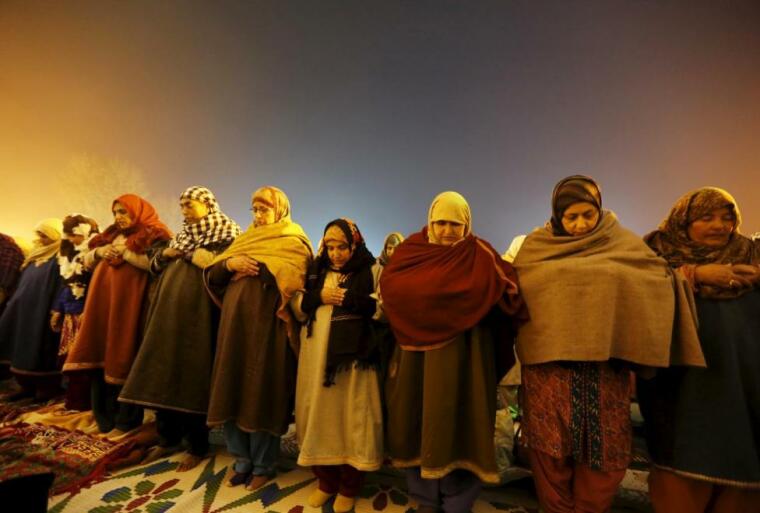Muslim women in India break tradition, train to become judges
Women in India's largest religious minority are poised to break tradition by training to take on a role that's only been performed by Muslim men before.
Dissatisfied with their own lack of representation in court settlements and from being discriminated, Muslim women decided to empower themselves as the country allows a separate civil code among Muslims.

So the Bharatiya Muslim Mahila Andolan (BMMA) prepares these women to be "qazis" or judges through a year of training that will equip them with knowledge in Koranic law, constitutional law, and gender rights.
"There are many grave injustices against Muslim women, and we deserve a say in matters that concern us," one of the female trainees, Safia Akhtar, told Thomson Reuters Foundation.
Akhtar also thinks it's not impossible to take on such an important role as a "qazi" when the country already had a female prime minister before.
The Islamic seminary Darul-Uloom Deoband attested that the Islamic faith itself does not discriminate against women as the seminary defended the appointment of India's first female qazis Afroz Begum and Jahan Ara.
"Islam empowers women through knowledge. Nobody has any right to prevent women from becoming a Qazi or a Mufti," Maulana Ashraf Usmani, spokesperson of the seminary, told The Hindu.
Usmani added that anyone could be a religious leader and scholar so long as they're equipped with expertise, knowledge, and training.
The seminary spoke out after protests against the female qazis were voiced out by Rajasthan's conservative religious clerics.
Maulana Khalid Rashid Farangi Mahali, secretary of All India Muslim Personal Law Board, a non-governmental institution, spoke out against the female qazis.
"Women don't have the right to be a qazi," said Mahali. "Besides, there is no need — there are enough men who are qazis. So it's completely unnecessary,"
Zakia Soman, co-founder of BMMA, thinks otherwise.
"It's important to have women hear and represent women who are in a vulnerable position. Besides, there is no bar on women qazis as per the Koran," Soman said.
 Christians don't have to affirm transgenderism, but they can’t express that view at work: tribunal
Christians don't have to affirm transgenderism, but they can’t express that view at work: tribunal Archaeology discovery: Medieval Christian prayer beads found on Holy Island
Archaeology discovery: Medieval Christian prayer beads found on Holy Island Presbyterian Church in America votes to leave National Association of Evangelicals
Presbyterian Church in America votes to leave National Association of Evangelicals Over 50 killed in 'vile and satanic' attack at Nigerian church on Pentecost Sunday
Over 50 killed in 'vile and satanic' attack at Nigerian church on Pentecost Sunday Ukrainian Orthodox Church severs ties with Moscow over Patriarch Kirill's support for Putin's war
Ukrainian Orthodox Church severs ties with Moscow over Patriarch Kirill's support for Putin's war Islamic State kills 20 Nigerian Christians as revenge for US airstrike
Islamic State kills 20 Nigerian Christians as revenge for US airstrike Man who served 33 years in prison for murder leads inmates to Christ
Man who served 33 years in prison for murder leads inmates to Christ


 Nigerian student beaten to death, body burned over ‘blasphemous’ WhatsApp message
Nigerian student beaten to death, body burned over ‘blasphemous’ WhatsApp message 'A new low': World reacts after Hong Kong arrests 90-year-old Cardinal Joseph Zen
'A new low': World reacts after Hong Kong arrests 90-year-old Cardinal Joseph Zen Iran sentences Christian man to 10 years in prison for hosting house church worship gathering
Iran sentences Christian man to 10 years in prison for hosting house church worship gathering French Guyana: Pastor shot dead, church set on fire after meeting delegation of Evangelicals
French Guyana: Pastor shot dead, church set on fire after meeting delegation of Evangelicals ‘Talking Jesus’ report finds only 6% of UK adults identify as practicing Christians
‘Talking Jesus’ report finds only 6% of UK adults identify as practicing Christians Mission Eurasia ministry center blown up in Ukraine, hundreds of Bibles destroyed: 'God will provide'
Mission Eurasia ministry center blown up in Ukraine, hundreds of Bibles destroyed: 'God will provide' Church holds service for first time after ISIS desecrated it 8 years ago
Church holds service for first time after ISIS desecrated it 8 years ago Burger King apologizes for 'offensive campaign' using Jesus' words at the Last Supper
Burger King apologizes for 'offensive campaign' using Jesus' words at the Last Supper Uganda: Muslims abduct teacher, burn him inside mosque for praying in Christ’s name
Uganda: Muslims abduct teacher, burn him inside mosque for praying in Christ’s name